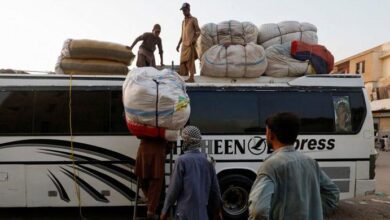China, Myanmar tied for worst internet freedom: Freedom House

China and Myanmar are tied for the worst internet freedom environments in the world, as digital freedoms decline globally for the 14th year in a row, according to a Freedom House report published Wednesday.
The global decline was especially concerning considering just how many elections are being held this year, said Kian Vesteinsson, the report’s co-author. Dozens of countries have held, or are scheduled to hold, national elections globally in 2024.
“A free and open internet is critical for a well-functioning democracy in the 21st century, but as people around the world went to the polls, they struggled to access reliable information online,” Vesteinsson told VOA.
For its annual Freedom on the Net report, Freedom House surveyed 72 countries, which comprise about 87% of the world’s population of internet users. Of those, 41 held or will hold national elections this year.
In the subset of nations holding elections, Freedom House found that in 25 countries governments had blocked websites, restricted access to social media platforms or completely cut off internet connectivity. In nearly all cases, pro-government commentators had manipulated online information and often promoted lies about the democratic process.
The report also found that violent attacks and retaliatory arrests are being used as a way to silence online speech.
The repressive measures identified by Freedom House “grew more rampant” at a time when millions of people around the world were preparing to vote, Vesteinsson said. “Potentially chilling their comfort in speaking about politics online.”
In 18 countries the rights organization documented improvements. Iceland maintained its ranking as the best internet freedom environment in the world. On the other end of the spectrum, protections for human rights online deteriorated in 27 countries, according to the report.
The study found that China and Myanmar are now tied for the worst internet freedom environment in the world. This is the first time that any country has ranked as low as China in a decade, the report said.
Internet freedom in Myanmar has progressively deteriorated since the country’s military took power in a 2021 coup, according to Vesteinsson. The junta’s tactics include blocking independent news sites and enforcing widespread internet shutdowns.
“This is a story of how the military has launched measure after measure that is aimed at cutting Myanmar’s people off from a free and open Internet,” Vesteinsson said.
Neither China’s Foreign Ministry nor Myanmar’s military replied to VOA’s requests for comment.
Although China and Myanmar now share the worst ranking, Vesteinsson added that the landscapes for internet freedom in both countries are very different. While people in China have faced systematic censorship for decades, people in Myanmar are still learning how to live under this relatively new censorship regime, he said.
“It takes time for these repressive measures to shape people’s ability and capacity to express themselves freely,” Vesteinsson said.
Kyrgyzstan, however, is the country whose internet freedom record dropped the most compared to last year, according to the report.
“The decline reflects the broader efforts that [Kyrgyzstan President Sadyr] Japarov has taken to rig the political system in his favor since he’s come to power,” the report’s co-author Grant Baker told VOA.
Kyrgyzstan’s government has ramped up its crackdown on independent media over the past year, including with the forced shutdown of the critical news site Kloop.
Kyrgyzstan also enacted a Russian-style foreign agent law that forces nonprofits, including news outlets, that receive foreign funding to register as “foreign representatives.” Press freedom groups have warned the law could be used to target critical news outlets.
Other countries whose scores declined the most over the past year include Azerbaijan, Belarus, Iraq and Zimbabwe, the report said.
While the general consensus for internet freedom is grim, there’s a bright spot in Zambia, which experienced the greatest improvement among surveyed countries.
Since Zambia’s 2021 election, government censorship has decreased and space for online activism has opened up, the report said.
“But it does come with one big caveat,” Vesteinsson said. While senior Zambian officials said the new government would not enforce a law that prohibits insulting the president, several people, including journalists, have been arrested over alleged online insults against the president in the past year.
Nevertheless, Zambian civil society groups are pushing for improvement, Vesteinsson said. In one case, advocacy groups took the country’s communications regulator to court over a requirement for mobile service providers to collect face print photos for SIM card registration.
“These really important efforts to push back against government repression have really facilitated this overall improvement in Zambia’s internet freedom over the years,” Vesteinsson said.



